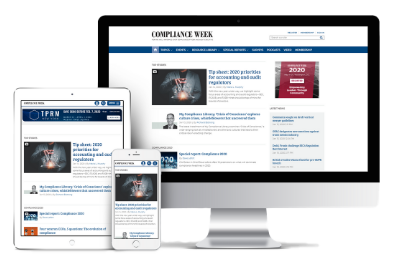May 29 | Creating TPRM Stability in an Unsettled World
Wondering how new approaches to age-old regulations affect ethical business practices across your extended enterprise? What about how tariffs may impact your supply chain integrity, and how to best adapt your organization to accelerated shifts in business practices?
When it comes to trust, make sure to verify
The increasing efforts to fight modern slavery across the globe are getting a boost from EU rules that require companies to track and report on the issue. But compliance executives can’t lean on easy databases and automated solutions, experts increasingly say, that supply chain companies may ignore or lie to.
U.K. Employment Rights Bill promises to thwart forced labor through new consolidated regulator
For the past decade, the United Kingdom has tried to make companies more directly accountable for forced labor in their supply chains. But lawyers warn that the government’s latest plans to beef up protections against worker violations risk being heavily watered down and poorly policed by regulators.
White House, BIS attempt to strengthen AI chip export controls in final days of Biden presidency
In tandem with the Commerce Department’s Bureau of Industry and Security, the Biden administration issued a new rule on export controls of domestically produced artificial intelligence chips.
Top 5 risks for 2025: U.S. uncertainty, global trade war, digital attacks
A prominent risk management firm has issued its predictions for the top five risks for business in 2025, along with guidance for how organizations should prepare and respond.
U.K. Employment Rights Bill triggers debate over flexibility vs. exploitation
Contract workers’ rights are in the spotlight in the U.K. and some EU countries as governments seek to end exploitative practices by eliminating zero-hours contracts, much to the chagrin of some business leaders.
What’s your risk appetite? EU firms grapple with ‘ridiculously complex’ ESG reporting rules
Discussions on the increasingly complex ESG rules in the EU were the crux of some conversations at Compliance Week Europe, a two-day conference in Amsterdam Oct. 15-16. The event brought together Compliance Week and its sister organization, the International Compliance Association, and more than 200 GRC professionals across industries.
New U.K. enforcement body piles pressure on sanctions evaders
Global sanctions rules are increasing rapidly, as are tools to detect and punish those who break them. In response, the U.K. government is creating a new Office of Trade Sanctions Implementation to investigate and penalize those who break sanctions rules.
Commerce Dept. unveils new supply chain risk assessment tool
The U.S. Department of Commerce unveiled a diagnostic supply chain risk assessment tool, which will “utilize a comprehensive set of indicators to assess structural supply chain risk across the U.S. economy,” the agency said.
U.K. forced labor ruling raises bar for supply chain monitoring
Companies will need to tighten up how they monitor their supply chains after a recent U.K. ruling determined that corporates could be open to money laundering charges if they fail to act in cases where they believe there is a risk of forced labor.
All hands on deck needed to get ESG disclosures right, report finds
Multiple emerging environmental, social, and governance and disclosure standards pose legal and operational risks to many companies, but also opportunities to improve reporting and get ahead of requirements, a new report found.
Risk visibility striking fear in companies onboarding new customers
A lack of risk visibility is causing companies to reject customers–and potentially lose money–over fears they might be in danger of violating rules around anti-money laundering and sanctions regulations.
French bus part supplier CBM to pay $2.4M to settle DOJ fraud allegations
A French bus parts supplier will pay more than $2.4 million in penalties, disgorgement, and restitution to settle charges that it fraudulently misled its U.S. customers about the source of some of its parts.
Q&A: Seaco general counsel, compliance head on environmental regulations
Dominic Buckwell, general counsel and compliance head at global marine container leasing company Seaco, discussed key themes including anti-money laundering, sanctions, and why the industry needs common environmental reporting standards.
Additions to UFLPA Entity List signal seafood supply chain risks
The U.S. Department of Homeland Security added three China-based entities across the seafood, aluminum, and footwear industries to the Uyghur Forced Labor Prevention Act Entity List.
Panelists break down robust sanctions landscape at TPRM Summit
Sanctions compliance officers face myriad challenges as complex geopolitical situations heighten risks worldwide, experts discussed during Compliance Week’s Third-Party Risk Management & Oversight Summit.
CPE Webcast: Techniques for more effective forced labor risk identification in supply chains
By requiring U.S. importers to prove that their supply chains are free of forced labor, the Uyghur Forced Labor Prevention Act (UFLPA) has created heightened nationwide demand for sophisticated supply chain mapping and risk identification capabilities.
Hyundai Motor caught in DOL complaint over child labor
The Department of Labor sued three Alabama businesses, including a Hyundai Motor manufacturing plant, for employing a 13-year-old worker on an auto parts assembly line.
Senate report cites VW, BMW, JLR for potential forced labor violations
A U.S. Senate report found three European automakers—Volkswagen, BMW, and Jaguar Land Rover—sold cars in the United States with parts sourced from a supplier suspected of using forced labor from China’s Xinjiang region.
Flex says no action by OFAC into possible sanctions violations
Flex disclosed in a public filing the Office of Foreign Assets Control is taking no action into potential sanctions violations the global manufacturer voluntarily self-disclosed in 2019.
UFLPA Entity List nearly doubles with textile industry sweep
The Department of Homeland Security announced its largest batch of additions to the list of companies blocked under the Uyghur Forced Labor Prevention Act in the form of a sweep of the Chinese textile industry.
e-Book: Managing increased risk of forced, child labor in your supply chain
Instances of forced or child labor in corporate supply chains are a growing problem in the United States.
Williams-Sonoma fined record $3.2M over admitted ‘Made in USA’ order violations
Kitchen and home retail company Williams-Sonoma agreed to pay nearly $3.2 million for failing to comply with a 2020 administrative order by the Federal Trade Commission prohibiting its marketing of imported goods as made in the United States.
e-Book: Tips for TPRM, supply chain due diligence
Implementing a risk-based approach to third-party due diligence frees up compliance resources to be deployed efficiently and helps organizations meet the expectations of regulators.
Report: Poor awareness of supply chain disclosure regs leaving firms exposed
Compliance failures in the supply chain are hampering organizations’ efforts to implement environmental, social, and governance initiatives and meet disclosure requirements, according to a new report by U.K. law firm Burges Salmon.



























